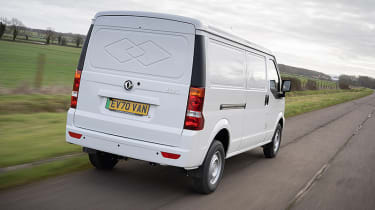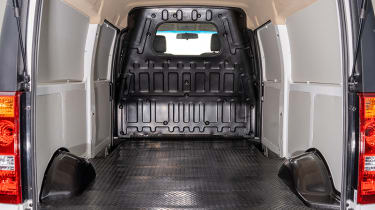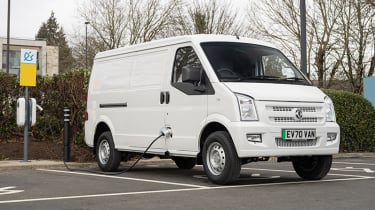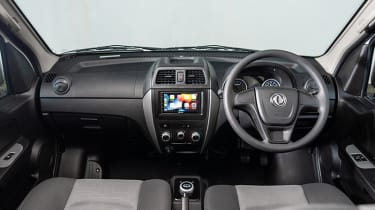DFSK EC35 electric van review
New Chinese electric van promises to be a budget alternative to more established names
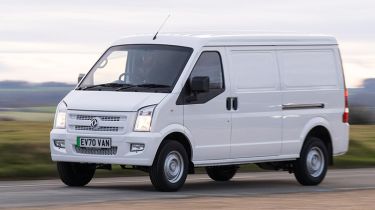
Pros
- Compact footprint
- Decent load volume
- Cheap for an electric van
Cons
- Low-rent feel
- Cramped cabin
- Bouncy when empty
| Van type | Range | Rapid charge time | Maximum cargo volume |
|---|---|---|---|
| Electric | 101-166 miles | 1hr 30mins (0-100%, 40kW) | 4.8 cubic metres |
All the big names in the commercial-vehicle market are offering zero-emissions vans right now, including Citroen, Peugeot, Vauxhall, Toyota, Nissan, Renault, Volkswagen and Mercedes. But the shift to electric power has also seen new names enter the fray, particularly from China. SAIC’s Maxus eDeliver 3 and Maxus eDeliver 9 have been available in the UK for some time, but there’s now a new offering from another Chinese brand, in the shape of the DFSK EC35.
The model name might be as anonymously forgettable as that of your tumble-dryer, but the EC35 isn’t a complete stranger to the UK market. A petrol-powered version called the Loadhopper (and sporting a curiously BMW-like grille) was offered here a few years back, but now newly founded importer Innovation Automotive is bringing the fully electric version to these shores.
It’s immediately obvious that the EC35 is based on the Loadhopper – but also that it’s larger than its predecessor, and more modern-looking. On the powertrain front, there’s a relatively small 39kWh battery for a claimed range of up to 166 miles. That, however, is the figure for the version limited to a top speed of 50mph. If you go for the 62mph model, that number drops to 101 miles. Clearly, then, this is a van intended for short-range urban jobs only – it won’t feel at home on the motorway and will quickly deplete its battery in that environment, too.
Keeping track of range on the go is tricky, too, as the trip computer won’t show you an estimated mileage figure. There’s just a percentage meter showing how much charge is remaining, so you need to zero the trip when fully charged to get an idea of how many miles per kilowatt-hour you’re managing.
CCS rapid charging at up to 40kW isn’t terribly fast compared to some rivals, but the modest battery size does mean you’ll be waiting at most around 90 minutes for a full top-up from a public point, and six hours from a wallbox. Speaking of rivals, there aren’t any direct ones, simply because the EC35 is so cheap. Once the government’s plug-in van grant has been deducted, you’re looking at just £21,000 to drive one away.
That’s about £5,000 less than the Citroen e-Berlingo and its Peugeot and Vauxhall stablemates, and £10,000 less than the Renault ZOE Van (which, admittedly, has a larger 52kWh battery). That means the EC35 is one of the first electric vans to achieve price parity with diesel-fuelled models of a similar size. Standard kit is decent, too: there’s an aftermarket Grundig touchscreen multimedia system (which gives you Apple and Android phone mirroring, Bluetooth and digital radio), along with parking sensors and a reversing camera. Air-conditioning, electric windows and a glovebox USB port also feature, while an alarm is optional.
You also get a pleasing amount of space for your money: the 4.5-metre long EC35 measures about the same front to back as the e-Berlingo, but is also two metres tall and a bit narrower, so it has high and skinny proportions. They result in a load volume of 4.8 cubic metres, which is a lot bigger than the 3.3 cubic metres on offer in the smallest version of the Citroen.
A top-hinged tailgate (optionally available with a window) and twin sliding doors are both standard, plus there’s a full steel bulkhead with a window and space for two Euro pallets. However, the EC35 lacks lashing eyes or tie-down points, so may not be as versatile as some rivals. Maximum payload is an impressive 1,015kg – although the already limited range will tumble even further if you get anywhere near that.
If you’re worried about buying from a lesser-known brand, the EC35 importer Innovation Automotive is offering a five-year/75,000-mile warranty, while the battery is covered against defects for up to 100,000 miles or eight years. Three years’ AA breakdown cover is also thrown in, but you’ll have to head to your nearest Halfords Autocentre for servicing: Innovation is selling the DFSK van directly to customers, so there are no dealerships involved.
Driving the EC35 is a straightforward matter. A beep lets you know it has been switched on and a rotary selector where the gearlever would normally be found lets you switch between drive, neutral and reverse – although you do have to have your foot on the brake while doing this, otherwise nothing happens.
The van is more comfortable and surefooted when there’s some weight in the load area: we tried it with and without 250kg ballast, and when empty it bounced around a lot, especially at more than 30mph. Refinement is poor to say the least, with little-to-no sound deadening to mask the loud whine from the electric motor.
Performance is a bit better, with the 80bhp motor getting you off the line in lively fashion and allowing you to keep up with urban traffic easily. Compact dimensions and light steering add to the DFSK's city-friendly nature, but as we’ve mentioned already, this really isn’t a vehicle for motorway or other long-distance work, while its tall and narrow shape can make it feel a bit nervous on twisty country roads, too.
Inside, occupants pay the price for those dinky dimensions in the form of a pretty cramped cabin and awkward seating position – particularly for taller drivers, who’ll probably find they can’t move the seat as far back as they’d like.
The pedals also feel a bit strange, as the brake is higher than the accelerator. The experience of driving the EC35 is further let down by very poor-quality plastic and other materials dominating the interior, as well as the exposed bulkhead and flimsy-feeling controls.
But none of that may matter if all you’re looking for is a simple and affordable electric van for light delivery duties around a town or city. The EC35’s price is hard to argue with, and although there are compromises to be made in terms of comfort and quality, it could make very sound financial sense for certain users.

